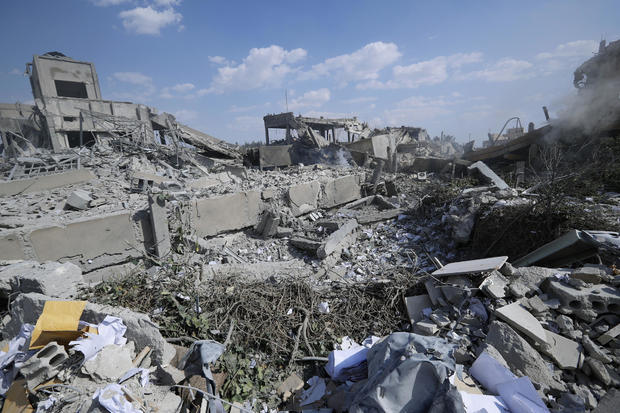A closer look at the sites the U.S. targeted in Syria strikes
The U.S., together with the U.K. and France, targeted three sites in Syria overnight in response to the Syrian regime's alleged use of chemical weapons on civilians last weekend. The Pentagon said a total of 105 weapons were launched in the operation.
"This is going to set the Syrian chemical weapons program back for years," Lt. Gen. Kenneth McKenzie, a director of the Joint Chiefs of Staff, said Saturday morning.
Chief Pentagon spokeswoman Dana White described the target choices as "very methodical" and called it a "deliberate decision" to go after chemical weapons facilities.
"The strikes went at the very heart of the enterprise to the research, to develop, to storage. So we are very confident that we have significantly crippled Assad's ability to produce these weapons," White said.
Barzeh research and development center, Damascus
The Pentagon said 76 missiles were aimed at the research center located northeast of central Damascus. McKenzie said 57 of the missiles were Tomahawk missiles, adding that the strikes "successfully destroyed" three buildings in the city.
The research center was used for development, production and testing of chemical and biological warfare technology, Chairman of the Joint Chiefs Gen. Joseph Dunford said at a news conference Friday.
Britain's Ministry of Defense said the facility was a former missile base where the Syrian regime keeps "chemical weapon precursors stockpiled in breach of Syria's obligations under the Chemical Weapons Convention." It said the facility is located "some distance from any known concentrations of civilian habitation, reducing yet further any such risk."
Images from The Associated showed the damage to the facility that was essentially reduced to rubble.
CBS News correspondent Seth Doane visited the site Saturday where the complex once stood. He spoke with a scientist only identified as Sayed who said his office -- and life's work -- were inside the building.
Sayed said he'd worked there for 38 years and cried when he saw the complex in ruins. He said it's "totally incorrect" that chemical weapons were being developed there. "The Organization for the Prohibition of Chemical Weapons (OPCW) visited here and didn't report anything wrong with this place," he said.
Him Shinshar chemical weapons storage site, west of Homs
The facility is located 15 miles west of Homs and was the primary location of Syrian sarin and precursor production equipment, Dunford said.
Twenty-two weapons were aimed at the site, including naval cruise missiles and scout teams, McKenzie said Saturday.
Second chemical weapons storage site, west of Homs
Seven missiles targeted the bunker, which was successfully hit, Gen. McKenzie said Saturday. He said the missiles were delivered from British, French and U.S. ships in the Mediterranean, and each strike hit around 4 a.m. in Syria.
"This strike aimed to deliver a clear and unambiguous message to the Syrian regime that their use of chemical weapons against innocent civilians is inexcusable and to deter any future use of chemical weapons," McKenzie said Saturday.
He said initial indications showed the strikes accomplished the Pentagon's "military objections without material interference from Syria."







